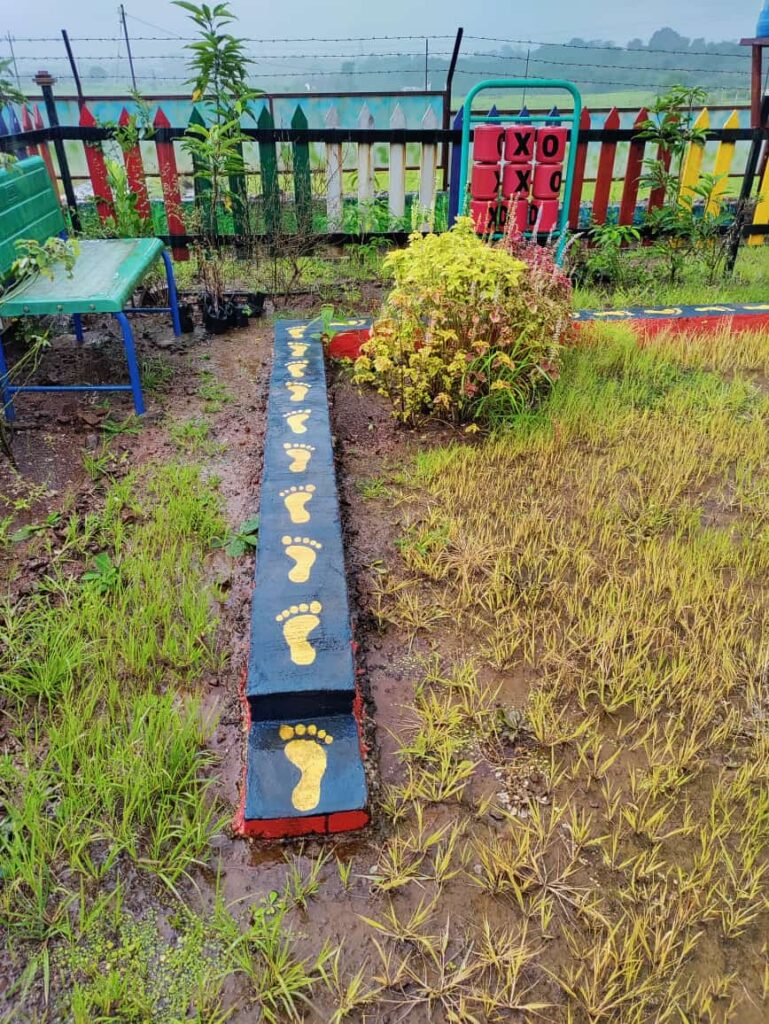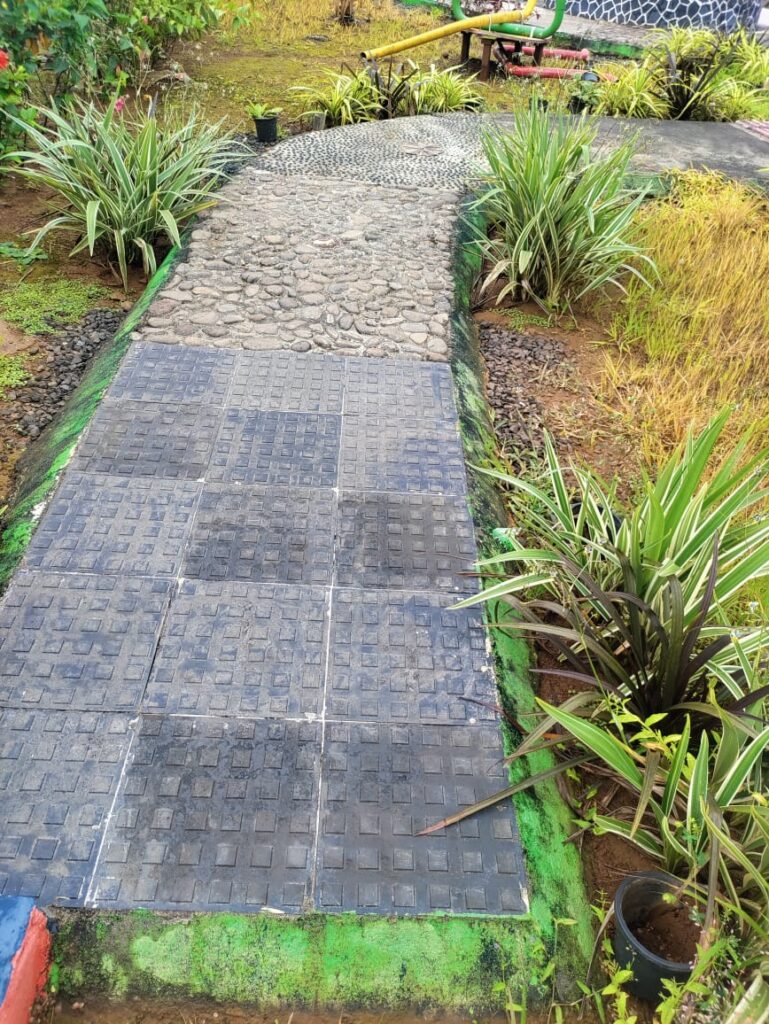The Sensory Garden, Igatpuri: A Haven for God’s Special Children

Part I

Nestled in the tranquil surroundings of Igatpuri, a sanctuary has been created for the most precious souls—our intellectually and cognitively challenged children, and those who are unable to hear or speak. The Sensory Garden, a labor of love funded by Divgi TorqTransfer Systems and built through the selfless dedication of the staff and teachers of Igatpuri Schools, is a testament to the power of compassion and community.
When I last visited in January, the garden was still in its infancy. Yet, the sheer determination and unwavering spirit of those involved were palpable. Returning just a few months later, I was overwhelmed by the transformation.
The Sensory Garden, now in full bloom, is a living testament to the incredible impact that can be achieved through the combined efforts of caring individuals.

The Benefits of Sensory Stimulation for Intellectually and Aurally Challenged Children
Sensory stimulation, which engages the five senses (sight, hearing, touch, taste, and smell), can offer significant benefits for intellectually and aurally challenged children. How?
- Enhanced Cognitive Development: Sensory experiences can help these children develop a greater understanding of their surroundings and improve their cognitive abilities. For example, touching different textures can help them learn about shapes, sizes, and materials.
- Improved Communication: Sensory stimulation can aid in communication development, especially for aurally challenged children. By engaging their other senses, they can better express themselves and understand the world around them. For instance, using sign language or tactile symbols can help them convey their thoughts and feelings.
- Emotional Regulation: Sensory experiences can help regulate emotions, reducing anxiety and stress. For example, the soothing sensation of a soft blanket or the calming scent of flowers can promote relaxation.
- Increased Engagement and Motivation: Sensory stimulation can make learning more engaging and enjoyable, leading to increased motivation. For instance, using colorful visuals or hands-on activities can capture their attention and make learning more meaningful.
- Sensory Integration: For children with sensory processing disorders, sensory stimulation can help them better integrate sensory information, improving their overall functioning. For example, providing opportunities for controlled sensory input can help them regulate their senses and avoid sensory overload.
In essence, sensory stimulation provides a rich and meaningful way for intellectually and aurally challenged children to explore the world, develop their skills, and enhance their overall quality of life.
As I ventured into this sensory haven, I couldn’t resist the urge to experience it first-hand.
I embarked on a journey along the winding path, my senses awakened by the diverse textures beneath my feet.
Each step was a revelation, a symphony of sensations that danced across my toes, heels and my soul.
My heart swelled with admiration for Mother Rukmakka, the guiding light whose unwavering faith and selfless love ignited the creation of this haven. Without her divine inspiration, this sensory sanctuary would have remained a mere dream, a vision unfulfilled. Her blessings, like gentle rain upon parched earth, nurtured the seeds of compassion and hope, allowing them to blossom into this extraordinary garden of healing and joy.
Mother Rukmakka’s spirit permeates every corner of this sacred space, a silent yet powerful presence that whispers words of encouragement and understanding to each visitor. Her legacy lives on in the laughter of the children who frolic among the fragrant flowers, the touch of gentle hands exploring the textured pathways, and the hushed conversations that echo through the tranquil air.
As I wandered through the Sensory Garden, I felt a profound sense of gratitude for Mother Rukmakka and all those who had contributed to its creation. Their love and dedication had transformed a barren landscape into a place of wonder and healing, a testament to the enduring power of the human spirit.
The Sensory Garden: A Haven for God’s Special Children
Part II
Sand, Marble and the Spoon

A canvas of shimmering sand, dotted with vibrant marbles like precious jewels, awaited the eager hands of the Special Child of God. Each marble, a unique hue, whispered its secret to the curious minds that hovered above.
The teacher’s voice, a gentle melody, guided the children on a treasure hunt, whispering the color of the marble they must seek.
Armed with a big spoon, tiny explorers embark on their quest, their eyes scanning the sandy expanse for the precious gem. With delicate movements, they scoop up the marble, their fingers tracing its smooth contours. As they place the marble back in its original spot, a sense of accomplishment washes over them, a tiny victory in their journey of discovery.
This simple game, a harmonious blend of tactile exploration and cognitive challenge, nurtured the young minds and nimble fingers of these extraordinary children. With each successful placement, their confidence blossomed, their spirits soaring higher than the sun-kissed sky.
Music, a Sensory Symphony for All

Music, a universal language that transcends words, offers a profound sensory experience for all, including those with intellectual and auditory challenges. Playing musical instruments like the drum, guitar, bongo, and xylophone can stimulate multiple senses and provide numerous benefits.
For intellectually challenged children:
- Cognitive Development: Playing instruments can enhance problem-solving, memory, and attention skills.
- Fine Motor Skills: Manipulating instruments requires precise movements, improving hand-eye coordination.
- Emotional Expression: Music provides a non-verbal outlet for expressing feelings, promoting emotional regulation.
For aurally challenged children:
- Sensory Awareness: Playing instruments can heighten awareness of sounds and vibrations, stimulating tactile and kinesthetic senses.
- Rhythm and Timing: Developing a sense of rhythm and timing can improve coordination and motor skills.
- Social Interaction: Group music therapy fosters social skills and a sense of belonging.
By engaging multiple senses and providing opportunities for creative expression, music therapy can empower intellectually and aurally challenged children, fostering their growth, development, and overall well-being.
Please do visit the Sensory Gardens at Igatpuri run by the schools of the special kids
A Visual Feast for the Senses

Watching colored water flowing through pipes from one level to another can be a captivating and stimulating experience for intellectually and aurally challenged children. The vibrant colors and mesmerizing movement of the water can engage their visual senses in a variety of ways.
- Sensory Stimulation: The contrasting colors and fluid motion can capture their attention, stimulating their visual cortex and promoting sensory awareness.
- Cognitive Development: Observing the water’s flow can help them understand concepts like cause and effect, as well as spatial relationships and patterns.
- Calming Effect: The rhythmic movement of the water can have a soothing and calming effect, reducing anxiety and promoting relaxation.
- Language Development: Describing the colors, shapes, and movements of the water can help improve language skills and vocabulary.
By providing a visually engaging and stimulating experience, watching colored water flow can enhance the visual senses of intellectually and aurally challenged children, fostering their cognitive development, emotional well-being, and overall quality of life.
A Tactile Journey for the Senses

Walking through different textures of the ground surface can be a profoundly enriching experience for intellectually and aurally challenged children. Engaging their sense of touch can have numerous benefits:


- Sensory Exploration: Exploring various textures can stimulate the tactile receptors in their feet, providing a rich sensory experience.
- Cognitive Development: Differentiating between textures can enhance their ability to discriminate and categorize information, improving cognitive skills.
- Emotional Regulation: The tactile sensation of the ground can be calming and grounding, helping to regulate emotions and reduce anxiety.
- Motor Development: Walking on uneven surfaces can strengthen their muscles and improve balance and coordination.
- Sensory Integration: For children with sensory processing disorders, exploring different textures can help them integrate sensory information more effectively.
By providing a variety of tactile experiences, walking through different ground surfaces can enhance the sense of touch, promote emotional well-being, and support overall development in intellectually and aurally challenged children.
